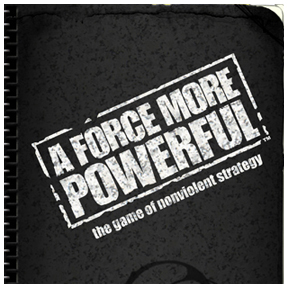-

-

-
-
QA: Ivan Marovic
-
Former Serbian student activist develops game that teaches how
to force regime change through nonviolent means.
-
Friday, February 3, 2006
- By Red Herring
-
- Ivan Marovic grew up around
computers to become a Serbian student activist and the creator of a
game that teaches how governments can be changed through the power
of nonviolence.
At the age of 12, his parents bought him a Commodore 64 that helped
nurture his love for computers. He attended a high school in Serbia
known for its computing courses and he hoped to become a computing
engineer.
As a college student in the 1990s, Mr. Marovic, now 32, focused more
on having fun with friends and studying science courses than on what
was happening in his country.
But then Slobodan Milosevic tampered with ballots in a mayoral
election, and that all changed. Mr. Marovic and his friends helped
organize protests that, four months later, forced the government to
reverse the voting results.
Otpor, a student protest group founded by Mr. Marovic and others,
helped topple Mr. Milosevic. Otpor members have continued to work
with groups like the International Center for Nonviolent Conflict (ICNC),
teaching protest groups from other countries peaceful tactics to
force regime change.
- Mr. Marovic spoke with Red Herring
as he worked to tweak the algorithms unique to his game.
Q: How can you make a computer game that doesn’t have any action?
A: It’s like political jujitsu. I had to use matrix math, a
type of calculus, to develop an algorithm that would respond to
various things in the game—not just the regime or the opposition,
but to fear, literacy, enthusiasm.
It’s very hard to give a numerical value to things like fear and
enthusiasm. It’s not just adding certain numbers and getting a
result. My mechanical engineering background helps me—the
programmers rarely go that deep.
Q: Who is the market for A Force More Powerful?
A: The main target for this game is activists. It allows a
player to try out different [tactics] before trying them out in the
real world. But it also would appeal to other people interested in
the subject—NGOs [nongovernmental organizations], people helping
organizations. Then there are also gamers who would want to play a
good strategy game.
Q: It can’t be a cut-and-dried win/lose situation.
A: This is a nonviolent war. No one gets killed. But some
people get defeated. There are several layers. It’s not a “one move,
one solution” type of game. There are no objectives set up by the
designer. You pick your own objectives.
The CD ships with 10 fictional scenarios, like unseating a corrupt
mayor, getting rid of occupational forces, giving women the right to
vote. People can create their own scenarios too, based on real-life
situations, and post them on the web.
People from all over the world could play, and hopefully it will
trigger discussions about the real situation. Who knows? It could be
a trigger for what they really will do. I can hardly wait to see!
Q: Would that, then, make it like the massively multiplayer
online games in which thousands of people play on the Internet?
A: Not at all.
Q: I can’t help but think that the taint of “educational
games”—which makers tried to market as “kids have fun and don’t know
they’re learning” without really fooling any child—would make some
people think this game is boring.
A: There were some people who asked, “Who would play a game
that’s like reality? We want elves and dragons.” But anyone who
likes a good strategy will like this game. And when they post [their
own scenarios] on the web, they can import real-world maps.
It won’t be an escape from reality. You can make a scenario about
your own country.
Q: How can you know that nonviolent tactics would be effective?
A: The object is to create a lose-lose situation. For
example, if you have some street theater performance that
[criticizes] a regime, the regime will lose either way. Either they
make arrests and get bad publicity, or they do nothing and [the
protesters’ message] will be heard.
|